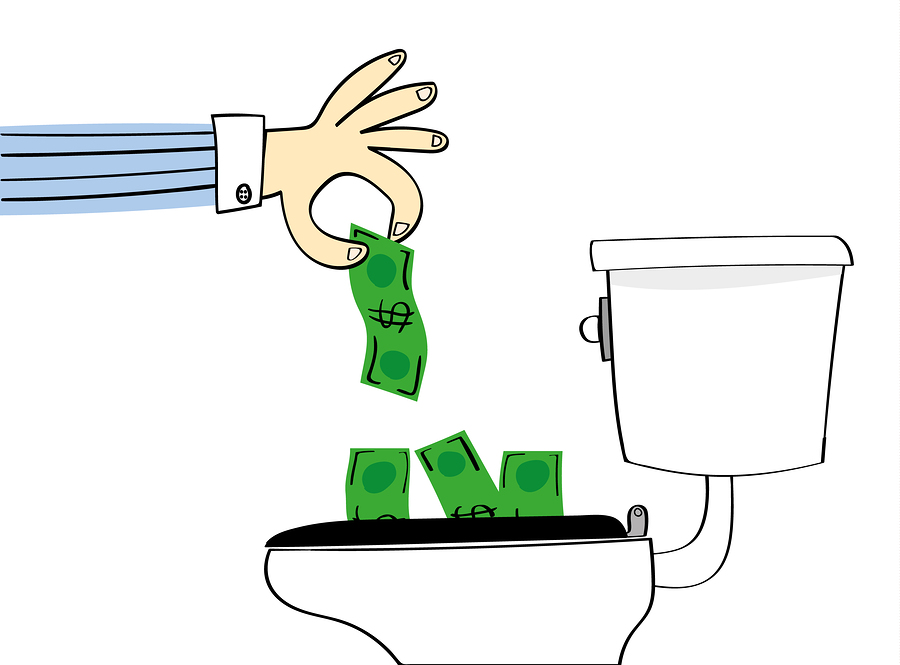
If you don’t take care of your tiny business, it’s like flushing money down the toilet.
The government defines small businesses as companies making less than $7 million a year or having fewer than 500 employees. The companies I work with generally have three or fewer employees and only dream about seven million dollar revenues. I call these “tiny” businesses.
As tiny businesses, we’re generally ignored by the government. When you hear something in the news about Congress passing legislation to “help” small business owners—they don’t mean us. That’s okay with me. We tiny businesses can get into enough trouble all by ourselves. Here are my top 5 picks for tiny business problems.
1. Not working around Roadblocks. Every tiny business has roadblocks; you need a license, or special training or there’s a law change. No matter what type of business you have, there will be roadblocks. The successful tiny business finds a way to work through or around them.
True story: There was a small business owner who was basically ready with her business; the only thing left was to get her web-site up. She had asked me for some help. Mind you, the only thing stopping her business from getting off the ground (at least as she explained it to me) was her website. I gave her names of people who could make her website for a fee and I also gave her free website resources as budget was an issue for her.
Six months later we met again. She still didn’t have a website. The work was stalled because she couldn’t find the “right” art for it. She wanted a picture of a compass. She had hired a high school kid to draw it for her for free. He wasn’t done yet. Okay—go to Google images, type in compass and you get hundreds of pictures. Granted, she’d probably have to pay to use one of those pictures but her “free artist” hadn’t gotten the work done in six months.
And letting a high school kid that you’re not even paying be the reason your business hasn’t gotten off the ground? That’s ridiculous. Now in fairness, the compass idea was a cool idea and it tied to her business theme. But—it wasn’t necessary to her business. She could have already been up and running for 6 months while waiting for this art that she wanted so badly.
Sometimes, we’re our own worst enemies. If you’ve got a roadblock that’s holding your business back get a second opinion. There’s usually more than one way to skin a cat.
2. Not knowing who your customers are. If you own a business you’re selling something. The tough question is who’s going to buy it?
I once knew a woman who had started a business making bows. She had made hundreds of bows, invested in a bow making machine and lots of expensive ribbons. She hadn’t sold a single one. She really liked making bows so that was what she was doing with her time, but she hadn’t figured out who would buy them. At that point, that wasn’t really a business it was just a hobby. You have to have customers, someone willing to pay for what you’re selling to be a real business.
3. Partner problems. Recently I was asked, “Why do you hate partnerships?” It was a fair question, I was being pretty negative. The truth is, I don’t hate partnerships, I’ve just had to dissolve too many of them. Partnerships get started because two or more friends decide they want to go into business together. Good friends (or spouses) do not always make good business partners. If there is a disagreement—how do you settle it?
I recently sat down with a couple that had a pretty good business plan and they seemed to be a good choice for a partnership. But I was asking a lot of questions and I’m glad I did. It seemed that Adam and Eve each had two income streams that they were thinking about for the partnership—sales of widgets and sales of thingamajigs. Adam was going to cut back on his widget sales to pursue the thingamajig sales full time in the partnership. Eve couldn’t sell thingamajigs she was just going to help Adam with that and in the meantime she would still sell widgets. It all sounded like a good plan.
Except: Widget sales was technically another job. The money Eve earned selling widgets was outside the partnership—just as Adam’s widget sales were outside the partnership. Adam was counting on Eve’s widget income to help support him because he knew that the thingamajig income wouldn’t be enough to support him during the first year. Eve was hoping the thingamajig income would supplement her widget income; she wasn’t planning on turning over half of her widget income to Adam.
The bright side to this scenario is that they were thinking and talking before they made the partnership. They hit a roadblock, yes, but they’re smart and will work around it somehow. Too often I see partners who went into business together and later wind up fighting because they didn’t spell out their expectations up front.
4. You gotta work at your business—I can’t tell you how many times people have come to me because they bought a business or invested in a business that required no work—and they lost their money. If it sounds too good to be true, it probably is. And if you’re picking a business, do something you love to do—because you’re going to be at it a lot.
5. Not planning for your taxes—This wouldn’t really be a tax blog if I didn’t mention taxes now would it? The whole idea about owning a business is that you want to be profitable. If you’re making a profit, then there are going to be taxes. If your small business is making enough money to support you and your family then you know you’ve got self-employment taxes to pay.
Screwing up one year—that happens. Screwing up two years—you need to be more careful. But if you screw up and don’t make your estimated tax payments after you’ve been profitable and owed tax money for three years in a row—you’re asking for trouble. Our business cards say, “If you don’t have a strategy for your taxes, you’re probably paying too much.” Taxes take a huge chunk out of your earnings. Don’t let IRS penalties and interest make matters worse.

